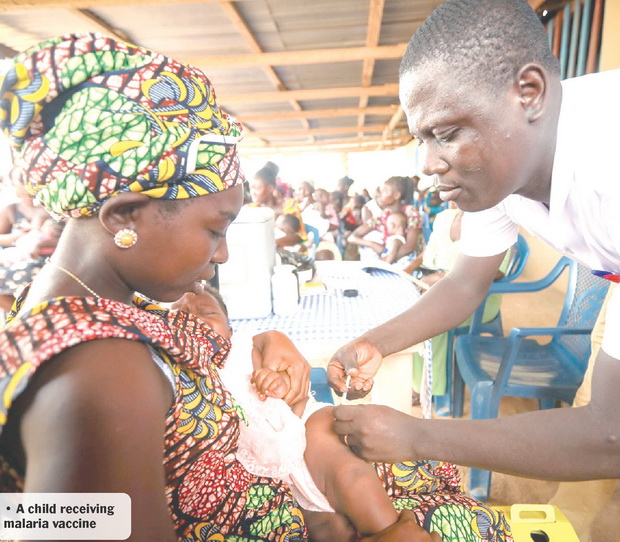
Introducing malaria vaccine into immunisation, one year on...
Eno, a healthy-looking, bubbly six-month-old baby girl, is one of thousands of children who are unaware of their role in the pilot implementation of a new malaria prevention tool with the potential to significantly reduce malaria in children.
In April last year, children roughly six months old from selected areas in Ghana were among the first children to receive their first dose of RTS,S malaria vaccine through routine immunisation.
Eno's mother, Salome, readily brought her daughter for vaccination, understanding that the vaccine could reduce the number of times a child got malaria, including life-threatening severe malaria.
One year on...
Introducing malaria vaccine into immunisation
"My older daughter Akosua, who is five years old, first became ill with malaria at nine months, which became a bother to me as it happened frequently and anytime it happened, I spent hours and also spent a lot of time and money seeking care for her. I have since been educated to ensure all my children sleep under mosquito nets always and also report to the facility whenever they feel unwell, and I just wanted this recurring sickness and suffering of my child to end. Since then, I have decided to take all necessary precautions to protect my family from malaria and this is why I have brought Eno, my six-month-old baby, to take the vaccine as I am told it will provide additional protection besides the net and other malaria prevention methods," Salome said.
RTS,S malaria vaccine
The Ministry of Health is introducing the RTS,S malaria vaccine (Mosquirix) in selected areas of high malaria transmission. The RTS,S vaccine acts against plasmodium falciparum, the most deadly malaria parasite globally and the most prevalent in Africa. It was developed specifically for African children who are at the highest risk of dying of malaria.
Although in recent years malaria death rates in the African region have dropped significantly following a major scale-up of long-lasting insecticidal nets (LLINs), artemisinin-combination therapies (ACTs) and other malaria control measures, the disease continues to take a heavy toll. Malaria control progress has slowed, particularly in sub-Saharan Africa.
In 2018, the African region was home to 94 per cent of all malaria deaths globally (or an estimated 405,000 deaths), mainly among young children. (World Health Report 2019).
Pilot programme The RTS,S vaccine is undergoing phased introduction by the Ministries of Health of Malawi, Ghana and Kenya. Children who present to health facilities for vaccination in the pilot areas receive the vaccine as part of their routine immunisations. Approximately 360,000 children per year across the three pilot countries will receive the RTS,S vaccine.
In Ghana, the pilot or phased introduction took off in April 2019. Children in 44 selected districts in the Bono, Ahafo, Bono East, Central, Volta, Oti and Upper East regions are receiving the vaccine, which is given at six months, seven months, nine months and 24 months of age. To date, 106,000 children in Ghana have received the first dose of the vaccine. The programme is expected to continue through 2023.
Safety
Safety of the vaccine is a top priority. In July 2015, the European Medicines Agency - a stringent regulatory authority - issued a positive scientific opinion of RTS,S, indicating that the benefits of the vaccine in preventing malaria outweighed potential risks, said Dr Kwadwo-Odei Antwi-Agyei, a Senior Technical Advisor at PATH and former EPI Manager of the Ghana Health Service (GHS).
Highlights
- RTS,S/AS01 (RTS,S) is a vaccine that acts against Plasmodium falciparum, the deadliest malaria parasite globally and the most prevalent in Africa.
- It is the first, and to date the only vaccine that has demonstrated it can significantly reduce malaria and life- threatening severe malaria in young African children.
- Beginning in 2019, three sub- Saharan African countries - Ghana, Kenya and Malawi - led the introduction of the vaccine in selected areas of moderate-to- high malaria transmission as part of a large-scale pilot programme.
"As with other new vaccines, and in line with national regulations, the safety profile for RTS,S will continue to be monitored," he added.
Collaboration
The malaria vaccine pilot programme is a collaboration between the Ministry of Health and a range of in- country and international partners and coordinated by WHO.
The Ghana Food and Drugs Authority (FDA) is working with the GHS and in- country research partners to ensure the safety of children who receive RTS,S during the phased introduction.
Separate from the introduction of the vaccine, independent evaluation teams are assessing its routine use.
"We look forward to the outcome of this ongoing evaluation that will inform decisions on the vaccine's broader use in high-burden areas in Ghana and elsewhere to complement the existing malaria tools being deployed," Dr Antwi- Agyei, said.
Funding for the pilot programme is provided by the Gavi, the Vaccine Alliance, the Global Fund to Fight AIDS, Tuberculosis and Malaria, and Unitaid. GSK is donating up to 10 million doses of RTS,S vaccine for use in the pilot phase. UNICEF is supporting the forecasting and deployment of the donated RTS,S vaccine to pilot countries.
